- Home
- Robert Graves
Claudius the God c-2 Page 3
Claudius the God c-2 Read online
Page 3
After a month or so Aristobulus, being out of favour at Antioch, decided to settle in Galilee, where he had an estate. It was only a two-days journey from here to Jerusalem, a city which he liked to visit on all the important Jewish festivals, being more religiously inclined than the rest of his family. But he did not wish to take all his money with him to Galilee, because if he happened to quarrel with his uncle Antipas he might be forced to go away in a hurry, and Antipas would be just so much the richer. He therefore decided to transfer most of his credit from a banking firm at Antioch to one at Rome and wrote to me as a trustworthy family friend, giving me authority to invest it in landed property for him as opportunity should present itself.
Herod could not return to Galilee: and he had also quarrelled with his uncle Philip, the Tetrarch of Bashan, over a question of some property of his father which Philip had misappropriated; and the Governor :of Judaea with Samaria - for Herod's eldest uncle, the King, had been removed for misgovernment some years previously and his kingdom proclaimed a Roman province - was Pontius Pilate, one of his creditors. Herod did not wish to retire permanently to Edom - he was no lover of deserts and. his chances of a welcome in Egypt by the great Jewish colony at Alexandria were inconsiderable. The Alexandrian Jews are very strict in their religious observances, almost stricter than their kinsmen at Jerusalem,' if that were possible, and Herod from living so long at Rome had fallen into slack habits, especially in the matter of diet. The Jews are forbidden by their ancient law-giver Moses, on hygienic grounds, I understand, to eat a variety of ordinary meat foods: not merely pork - one could make a case against pork, perhaps - but hare and rabbit, and other perfectly wholesome meats. And what they do eat must be killed in a certain way. Wild duck that has been brought, down by a sling-stone, or a fowl that has had its neck wrung, or venison got by bow and arrow, are forbidden them. Every animal that they eat must have had its throat cut and have been allowed to bleed to death. Then, too, they must make every seventh day a day of absolute rest: their very household servants are forbidden to do a stroke of work, even cooking or stoking the furnace. And they have days: of national mourning in commemoration of ancient misfortunes, which often clash with Roman festivities. It had been impossible for Herod while he was living at Rome to be at the same time both a strict Jew and a popular member of high society; and so-he had preferred the contempt of the Jews to that of the Romans. He decided not to try Alexandria or waste any more of his time in the Near East, where every door seemed closed to him. He would either take refuge in Parthia, where the king would welcome him as a useful agent in his designs against the Roman province of Syria, or he would return to Rome and throw himself upon my mother's protection: it might be just possible to explain away the misunderstanding with Flaccus., He rejected the idea of Parthia, because to go there would mean a complete breach with his old life, and he had greater confidence in the power of Rome than in that of Parthia; and besides it would be rash to try to cross the Euphrates the boundary between Syria and Parthia - without money to bribe the frontier guards, who were under orders to allow no political refugee to pass. So he finally chose Rome.
And did he get there safely? You shall hear. He had not even enough ready money with him to pay for his sea-passage - he had been living on credit at Antioch and in great style; and though Aristobulus offered to lend him enough to take him as far as Rhodes, he refused to humble himself by accepting it. Besides, he could not risk booking his passage on a vessel sailing down the Orontes, for fear of being arrested at the docks by his creditors. He suddenly thought of someone from whom he could perhaps raise a trifle, namely, a former slave of his mother's whom she had bequeathed in her will to my mother Antonia and whom my mother had liberated and set up as a corn-factor at Acre, a coastal city somewhat south of Tyre: he paid her a percentage of his earnings and was doing quite well. But the territory of the Sidonians lay between and Herod had, as a matter of fact, accepted a gift from the Sidonians as well as from the Damascenes; so he could not afford to fall into their hands. He sent a trustworthy freedman of his to borrow from this man at Acre and himself escaped from Antioch in disguise, travelling east, which was the one direction that nobody expected him to take, and so eluding pursuit. Once in the Syrian desert he made a wide circuit towards the south, on a stolen camel, avoiding Bashan, his uncle Philip's tetrarchy, and Petraea (or, as some call it, Gilead, the fertile Transjordan an territory over which his uncle Antipas ruled as well as over Galilee), and skirting the farther end of the Dead Sea. He came safely to Edom, where he was greeted warmly by his wild kinsmen, and waited in the same desert fortress as before for his freedman to come with the money. The freedman succeeded in borrowing the money - 20,000 Attic drachmae: as the Attic-drachma is worth rather more than the Roman silver piece, this came to-something over 900 gold pieces. At least, he had given Herod's note of hand to that amount, in exchange;: and would have arrived with the 20,000 drachmae complete if the corn-factor at Acre had not deducted 2,500, of which he accused Herod of having defrauded him some years previously. The honest freedman was afraid that his master would be angry with him for not bringing the whole amount, but Herod only laughed and said: 'I counted on that twenty-five hundred to, secure me the balance of the twenty thousand. If the stingy fellow had not thought that he was doing a smart trick in making my note of hand: cover the old debt he would never have dreamed of lending me any money at all; for he must know by now what straits I am in.' So Herod gave a great feast for the tribesmen and then made cautiously for the port of Anthedon, near the Philistine town of Gaza, where the coast begins; curving west towards Egypt. Here Cypros and her children were waiting in disguise on board the small trading-vessel in which they had sailed from Antioch and which had been chartered to take them on to Italy by way of Egypt and Sicily. Affectionate greetings between all members of the family thus happily reunited were just being exchanged when a Roman sergeant and three soldiers appeared alongside in a rowing-boat with a warrant for Herod's arrest. The local military governor had signed this warrant, the reason for which was the non-payment to the Privy Purse of a debt of 12,000 gold pieces.
Herod read the document and remarked to Cypros: `I take this as a very cheerful omen. The Treasurer has scaled down my debts from forty thousand to a mere twelve. We must give him a really splendid banquet when we get back to Rome. Of course, I've done a lot for him since I have been out in the East, but twenty-eight thousand is a generous return.'
The sergeant interposed, `Excuse me, Prince, but really you can't think about banquets at Rome until- you have seen the Governor here about this debt. He has orders not to let you sail until it's paid in full.'
Herod said: 'Of course I shall pay it. It had quite escaped my memory. A mere trifle. You go off now, in the rowing-boat, and tell His Excellency the Governor that I am entirely at his service, but that his kind reminder of my debt to the Treasury has come a little inconveniently. I have just been joined by my devoted wife, the Princess Cypros, from whom I have been parted for over six weeks. Are you a family man, Sergeant? Then you will understand how earnestly we two desire to be alone together. You can leave your two soldiers on board as a guard if you don't trust us. Come again in the boat in three or four hours time and we'll be quite ready to disembark. And here's an earnest of my gratitude.' He gave the sergeant 100 drachmae; upon which the sergeant, leaving the guard behind, rowed ashore without further demur. An hour or two later it was dusk and Herod cut the cables of the vessel and stood out to sea. He made as if to sail north towards Asia Minor but soon changed his course and turned south-west. He was making for Alexandria, where he thought he might as well try his luck with the Jews.
The two soldiers had been suddenly seized, trussed up, and gagged by the crew, who had engaged them in a game of dice; but Herod released them as soon as he was sure that he was not being pursued and said that he would put them safe ashore at Alexandria if they behaved sensibly.. He only stipulated that on his arrival there they should pretend to be his military bodyg
uard for a day or two; and promised in return to pay their passage back to Anthedon. They agreed hastily, terrified of being thrown overboard if they displeased him.
I should have mentioned that Cypros and the children had been helped out of Antioch by a middle-aged Samaritan called Silas, Herod's most faithful friend. He was a gloomy-looking, solidly-built fellow with an enormous square-cut black beard, and had once, served in the native cavalry as a troop commander. He had been awarded two military decorations for his services against the Parthians. Herod had on several occasions offered to have him made a Roman citizen, but Silas had always refused the honour on the ground that if he became a Roman he would be obliged to shave his chin in Roman fashion, and that he would never consent to do that. Silas was always giving Herod good advice, which he never took, and whenever Herod got into difficulties used to say: `What did I tell you? You should have listened to what I said.' He prided himself upon his bluntness of speech, and was sadly wanting in tact. But Herod bore with Silas because he could, be trusted to stand by him through thick and thin. Silas had been his only companion during the first flight to Edom, and again but for Silas the family would never have escaped from Tyre the day: that Herod insulted Antipas. And at Antioch it had been Silas who had provided Herod with his disguise for escaping from his creditors, besides, protecting Cypros and the children and finding the vessel for them. When things were really bad Silas was at his best and cheerfullest, for then he knew that Herod would need his services and would give him an opportunity for saying, `I am entirely at your disposal, Herod Agrippa, my dear friend, if I may call you so. But if you had taken my advice this would never have occurred.' In times of prosperity he always grew more and more gloomy, seeming to look back with a sort of regret, to the bad old days of poverty and disgrace; and even encouraging them to return by his warnings to Herod that if he continued in his present course (whatever it might be) he would end as a ruined man. However, things were bad enough now to make Silas the brightest of companions. He cracked jokes with the crew and told the children long complicated stories, of his military adventures. Cypros who usually resented Silas's tediousness, now felt ashamed of her rudeness to this golden-hearted friend.
`I was brought up with a Jewish prejudice against Samaritans,' she told Silas, `and you must forgive me, if it has taken all these years forme to
overcome it.'
`I must ask your forgiveness too, Princess,' Silas replied 'forgiveness, I mean, for my bluntness of speech. But such is my, nature. I must take the liberty of saying that if your Jewish friends and relatives were in general a little less upright and a. little more charitable I should like them better. A cousin of mine was once riding on business from Jerusalem to Jericho. He came upon a poor Jew lying wounded and naked in the hot sun by the roadside. He had been set, on by bandits. My cousin cleansed his wounds and bound them up as best he could and then took him on his beast to the nearest inn, where he paid in advance for his room and his food for a few days the inn-keeper insisted on payment in advance - and then visited him on his way back from Jericho and helped him to get home. Well, that was nothing: we Samaritans are made that way. It was all in a day's work for my cousin. But the joke was that three or four well-to-do Jews a priest among them whom my cousin had met riding towards him just before he came on the wounded man, must have actually seen him lying by the roadside; but because he was no relation of theirs they had left him there to die and ridden on, though he was groaning and calling out for help most pitifully. The innkeeper was a Jew too. He told my cousin that he quite understood the reluctance of these travellers to attend to the wounded man: if he had died on their hands they would have become ritually unclean from touching a corpse, which would have been a great inconvenience to themselves and their families. The priest, the innkeeper explained, was probably on his way to Jerusalem to worship at the Temple: he, least of all, could risk pollution. Well, thank God, 'I am a Samaritan, and a man with a blunt tongue. I say what I think. I - '
Herod interrupted, 'My dear Cypros, isn't that a most instructive story? And if the poor fellow had been a Samaritan he wouldn't have had enough money to make it worth the bandits while to rob him.'
At Alexandria Herod, accompanied by Cypros, the children, and the two soldiers, went to the chief magistrate of the Jewish colony there - or Alabarch, as he was called. The Alabarch was answerable to the Governor of Egypt for, the good behaviour of his co-religionists. He had to see that they paid their taxes regularly and refrained from street riots with the Greeks and from other breaches of the peace. Herod greeted the Alabarch suavely and presently asked him for a loan of 8,000 gold pieces, offering in exchange to use his influence at the Imperial Court on behalf of the Alexandrian Jews.' He said that the Emperor Tiberius had written asking him to come to Rome immediately to advise him on Eastern affairs and that in consequence he had left Edom, where he was visiting his cousins, in a great hurry and with very little money in his purse for travelling expenses. The Roman bodyguard seemed to the Alabarch to furnish impressive proof of the truth of Herod's story, and he considered that it would indeed be very useful to have an influential friend at Rome. There had been riots lately in which the Jews had been the aggressors and had done serious damage to Greek property. Tiberius might feel inclined to curtail their privileges, which were considerable.
Alexander the Alabarch was an old friend of my family's. He had acted as steward of a large property at Alexandria which had been left to my mother in my grandfather Mark Antony's will and which Augustus, for my grandmother Octavia's sake, had allowed her to inherit, though he cancelled most of the other bequests. My mother brought this property as a dowry to my father when she married him, and it then went to my sister Livilla, who brought it as a dowry to Castor, Tiberius's son, when she married him; but Livilla soon sold it, because she led an extravagant life and needed the, money, and the Alabarch lost the management of it. After this, correspondence between him and my family gradually ceased; and though my mother had used her interest with Tiberius to raise him to his present dignity and might be supposed to be well-disposed towards him. still, the Alabarch was not sure how far he could count on her support if he became involved in any political trouble. Well, he knew that Herod had once been an intimate friend of the family, and so would have lent him money very readily had he been sure that Herod was still on good terms with us; but he could not be sure.. He questioned Herod about my mother; and Herod, who had foreseen the situation very clearly and had been clever enough not to be the first to mention her name, answered that she was in the best of health and spirits when she last wrote. He had brought with him, as if accidentally, a cordial letter from her, written to him just before he left Antioch, in which she included a budget of detailed family news. He handed it to the Alabarch to read and the Alabarch was even more impressed by it than by the bodyguard. But the letter concluded with the hope that Herod was now at last settled down to a useful political life on the staff of her esteemed friend Flaccus, and the Alabarch had just heard from friends at Antioch that Flaccus and Herod had quarrelled, and besides he could not be sure that Tiberius had really written the letter of invitation - which Herod had not offered to show him. He could not make up his mind whether to lend the money or not. However, he had just decided to do so, when one of the kidnapped soldiers, who understood a little Hebrew, said, `Give me only eight gold pieces, Alabarch, and I'll save you eight thousand.'
`What do you mean, soldier?' asked the Alabarch.
`I mean that this man's a swindler and a fugitive from justice. We are not his bodyguard, but two men whom he has kidnapped. There's an Imperial warrant out for his arrest because of a big debt at Rome.'
Cypros saved the situation by falling at the Alabarch's feet and sobbing, `For the sake of your old friendship with my father Phasael have mercy on me and my poor children. Do not condemn us to beggary and utter destruction. My dear husband has committed no fraud. The substance of what he has told you is perfectly true, though perhaps he has slightly c
oloured the details. We are indeed on our way to Rome, and owing to recent political changes we have the most golden expectations there; and if you lend us just enough money to help us out of our present difficulties, the God of our fathers will reward you a thousandfold. The debt on account of which my dear Herod was so nearly arrested is a legacy of his improvident youth. Once arrived at Rome he will soon find honourable means of repaying it. But to fall into- the hands of his enemies in the Syrian Government would be his ruin and the ruin of my children and myself.'
The Alabarch turned towards Cypros, whose fidelity to Herod in his misfortunes almost brought tears to his eyes, and asked, kindly but cautiously, `Does your husband observe the Law?'
Herod saw her hesitate a little and spoke for himself. `You must remember, sir, that I am an Edomite by blood: You cannot reasonably expect as much from an Edomite as from a Jew. Edom and Jewry are blood-brothers through our common ancestor, the patriarch Isaac; but before any Jew congratulates himself on God's peculiar favour to his nation let him remember how Esau, the ancestor of Edom, was tricked of his birthright and of his father's blessing by Jacob, the ancestor of Jewry. Drive no hard bargains with me, Alabarch. Show more compassion to a distressed and improvident Edomite than old Jacob did, or, as the Lord my God lives, the next spoonful of red lentil porridge that you put into your mouth will surely choke you. We have lost our birthright to you and with it God's peculiar favour, and in return we demand from you such generosity of heart as we ourselves have never failed to show. Remember Esau's magnanimity when, meeting, Jacob by chance at Peniel, he did not kill him.'
`But do you observe the Law?' asked the Alabarch, impressed by Herod's vehemence and unable to contradict his historical references.
'I am circumcised, and so are my children, and I and my whole household have always kept the Law revealed to your ancestor Moses as strictly as our difficult position as Roman citizens and our imperfect consciences as Edomites have allowed us.'

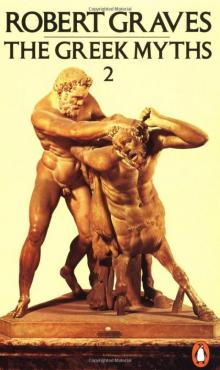 The Greek Myths, Volume2
The Greek Myths, Volume2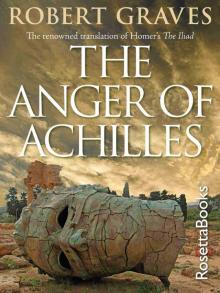 The Anger of Achilles: Homer's Iliad
The Anger of Achilles: Homer's Iliad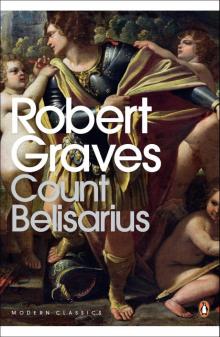 Count Belisarius
Count Belisarius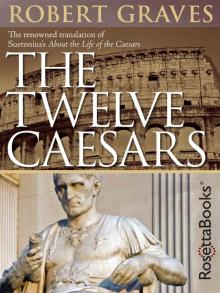 The Twelve Caesars
The Twelve Caesars Complete Poems 3 (Robert Graves Programme)
Complete Poems 3 (Robert Graves Programme) Homer's Daughter
Homer's Daughter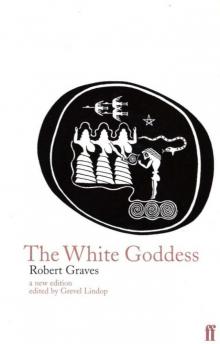 The White Goddess
The White Goddess Goodbye to All That
Goodbye to All That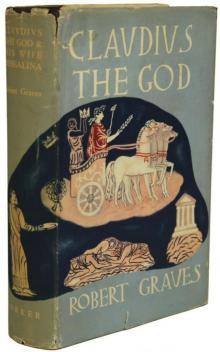 Claudius the God and His Wife Messalina
Claudius the God and His Wife Messalina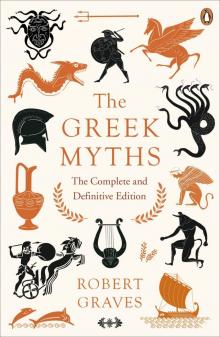 The Greek Myths
The Greek Myths I, Claudius
I, Claudius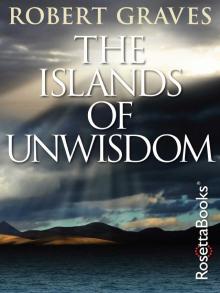 The Islands of Unwisdom
The Islands of Unwisdom Complete Short Stories
Complete Short Stories The Golden Fleece
The Golden Fleece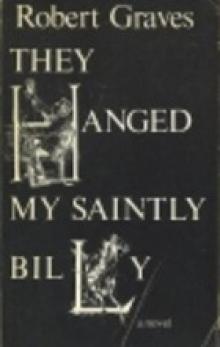 They Hanged My Saintly Billy
They Hanged My Saintly Billy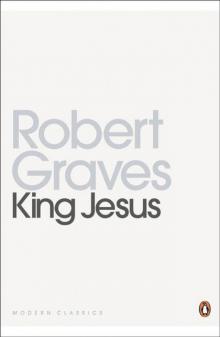 King Jesus
King Jesus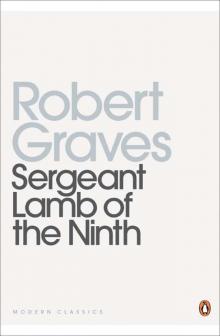 Sergeant Lamb's America
Sergeant Lamb's America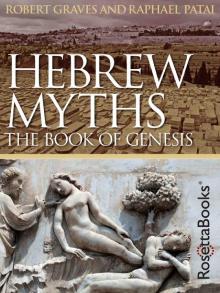 Hebrew Myths: The Book of Genesis
Hebrew Myths: The Book of Genesis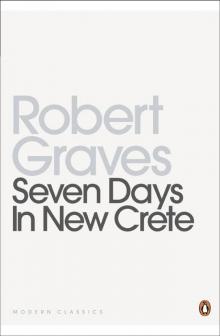 Seven Days in New Crete
Seven Days in New Crete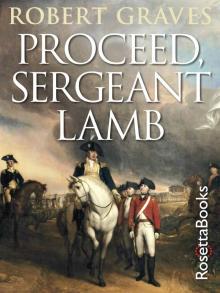 Proceed, Sergeant Lamb
Proceed, Sergeant Lamb Claudius the God
Claudius the God Wife to Mr. Milton
Wife to Mr. Milton The Complete Poems
The Complete Poems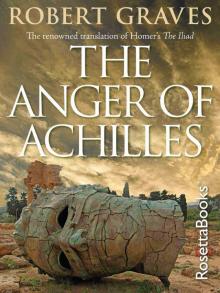 The Anger of Achilles
The Anger of Achilles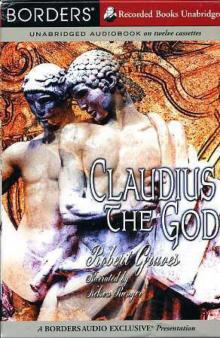 Claudius the God c-2
Claudius the God c-2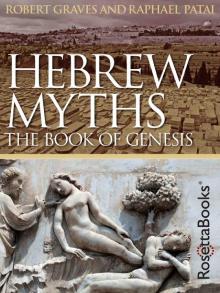 Hebrew Myths
Hebrew Myths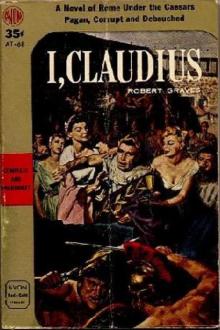 I, Claudius c-1
I, Claudius c-1 The Greek Myths, Volume 1
The Greek Myths, Volume 1